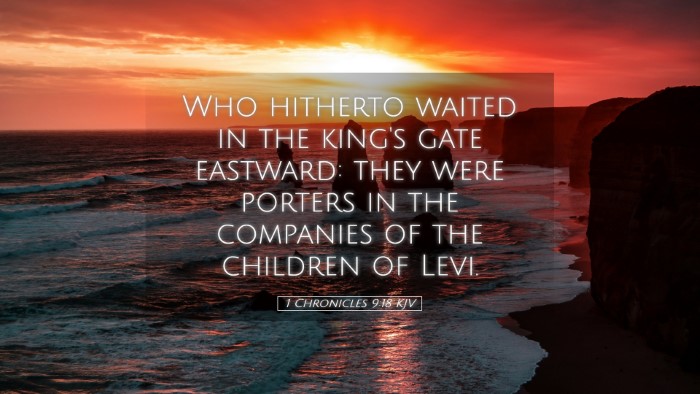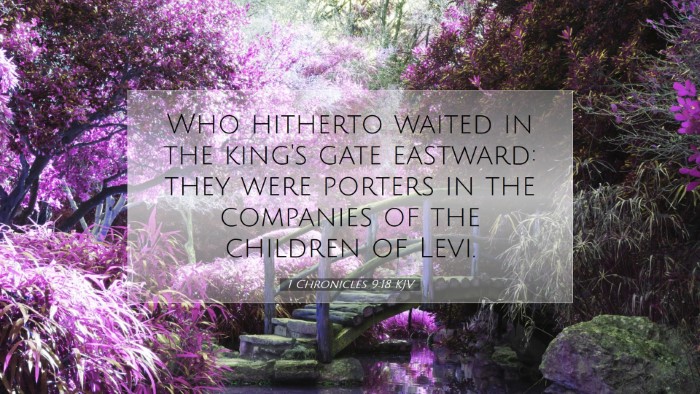Commentary on 1 Chronicles 9:18
Bible Verse: "Who dwelt at Jabez, the Tirathites, the Shimeathites, and Suchathites: these are the Kenites that came of Hammath, the father of the house of Rechab." (1 Chronicles 9:18)
Introduction
The genealogical records found in 1 Chronicles provide more than just a historical account; they are vital for understanding the identity, heritage, and role of certain groups within the broader narrative of the Israelites. Among these records, 1 Chronicles 9:18 encapsulates the complexity of families and clans within Israel, particularly focusing on the Kenites and their connections.
Overview of the Kenites
The verse specifically mentions the Kenites, a group traditionally understood to be descendants of Hobab, Moses' father-in-law. Their significance lies in their integration with the Israelites, particularly during the wilderness wanderings and the conquest of Canaan.
Historical Context
The Kenites were a nomadic clan that had settled among the Israelites; they brought their own traditions, guiding the communities they interacted with. The mention of the Kenites in genealogies highlights God's inclusive plan for redemption and acknowledges the cultural diversity within His chosen people.
Insights from Public Domain Commentaries
Matthew Henry's Commentary
Matthew Henry emphasizes the importance of remembering all parts of Israel's history, including minor details like names and families. He points out that the Kenites were not just bystanders but played a significant role in the unfolding story of salvation. The fact that they are mentioned underscores the theme of God's faithfulness across generations.
Albert Barnes' Notes on the Bible
Albert Barnes focuses on the geographical and familial associations presented in 1 Chronicles 9:18. He elucidates that Jabez, where they dwelt, has a rich significance, being tied to the prayer of Jabez found later in 1 Chronicles. The mention of the genealogical lineage indicates a purposeful preservation of their identity amidst changing times.
Adam Clarke's Commentary
Adam Clarke provides a detailed analysis of the names mentioned in the verse. He argues that each name holds a historical and theological significance. Clarke notes that the specific mention of the Tirathites, Shimeathites, and Suchathites may point towards certain occupations or roles they fulfilled within the community.
Theological Reflections
As we reflect theologically on 1 Chronicles 9:18, it becomes evident that this verse teaches us about God’s inclusivity and the unity of diverse clans under His covenant. The historical accounts of these families remind believers today of the strength found in community – a theme central to the New Testament church as well.
Practical Applications for Ministry
- Importance of Heritage: This verse serves as a reminder that understanding our heritage deepens our faith. Pastors can encourage congregations to explore their own genealogies in light of their faith journeys.
- Including All Voices: The reference to the Kenites illustrates the importance of inclusivity within the church community today, recognizing that all backgrounds provide valuable contributions.
- Community and Identity: As the Kenites were part of Israel's narrative, so too are we part of a larger community of believers. This can inspire unity and cooperation among congregations.
Conclusion
In summary, 1 Chronicles 9:18, while brief, is rich with historical and theological significance. Through the study of this verse and its associated commentaries, deeper insights can be gleaned about community, heritage, and the inclusive nature of God's redemptive plan. As pastors, students, and theologians, let us examine our own roles and contributions within the tapestry of faith that spans generations.


